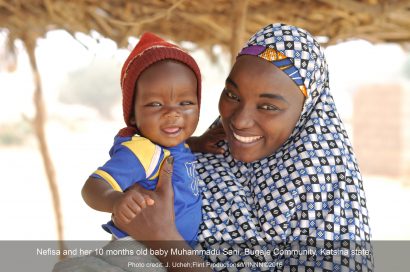 Nutrition
Nutrition
This brief is produced by the Operations Research and Impact Evaluation (ORIE) project, led by Oxford Policy Management (OPM), and it summarises the learning from an intervention to improve micronutrient supplementation in five states in northern Nigeria (Jigawa, Katsina, Kebbi, Zamfara and Yobe) with the support of the Working to Improve Nutrition in Northern Nigeria… Read more
This brief is produced by the Operations Research and Impact Evaluation (ORIE) project, led by Oxford Policy Management (OPM), and it summarises the learning from an Improved infant and young child feeding (IYCF) intervention implemented in five states in northern Nigeria (Jigawa, Katsina, Kebbi, Zamfara and Yobe) with the support of the Working to Improve… Read more
This brief is produced by the Operations Research and Impact Evaluation (ORIE) project, led by Oxford Policy Management (OPM), and it summarises the learning from a Community management of acute malnutrition (CMAM) intervention implemented in northern Nigeria, with the support of the Working to Improve Nutrition in Northern Nigeria (WINNN) programme. Key messages Political support… Read more
ORIE research on WINNN consisted of operations research, a mixed-methods impact evaluation, economic evaluation, and gender analysis which were conducted over a period of five years. This report integrates findings from this research to provide a high-level summary of WINNN’s achievements along with an overview of the key messages and recommendations that emerge from research… Read more
This report presents the results of the quantitative impact evaluation of the WINNN programme, three years since the baseline study. Using a quasi-experimental approach combined with community-level qualitative research, the study evaluates the impact of the WINNN programme as a whole on nutritional behaviours, nutritional status and provision of nutrition services. Data was collected from… Read more
This report presents the results of the quantitative impact evaluation of the WINNN programme, three years since the baseline study. Using a quasi-experimental approach combined with community-level qualitative research, the study evaluates the impact of the WINNN programme as a whole on nutritional behaviours, nutritional status and provision of nutrition services. Data was collected from… Read more
This report presents the results of the quantitative impact evaluation of the WINNN programme, three years since the baseline study. Using a quasi-experimental approach combined with community-level qualitative research, the study evaluates the impact of the WINNN programme as a whole on nutritional behaviours, nutritional status and provision of nutrition services. Data was collected from… Read more
This report presents the key findings of the qualitative evaluation of the WINNN programme conducted at the endline. The evaluation assessed WINNN’s contributions to change in the governance contexts for nutrition interventions, including civil society and community engagement. Qualitative data was collected through key informant interviews with various stakeholders such as government officials, health workers,… Read more
This report presents the findings of the full costs of the WINNN programme. The costing exercise assess the costs of delivering the WINNN outputs over the programme’s duration. All outputs are costed from a programme perspective i.e. considering the WINNN programme’s expenditure, while the IYCF and CMAM components are additional costed from a societal perspective…. Read more
This report presents the findings of the full costs of the WINNN programme. The costing exercise assess the costs of delivering the WINNN outputs over the programme’s duration. All outputs are costed from a programme perspective i.e. considering the WINNN programme’s expenditure, while the IYCF and CMAM components are additional costed from a societal perspective…. Read more
This report presents the findings of the cost-effectiveness of the IYCF and CMAM interventions supported by the WINNN programme. Cost-effectiveness is evaluated over the duration of the programme both from a health service and a societal perspective using incremental cost-effectiveness ratios (ICER) calculated for two outcome measures – disability-adjusted life years (DALYs) and lives saved…. Read more

 Nutrition
Nutrition














